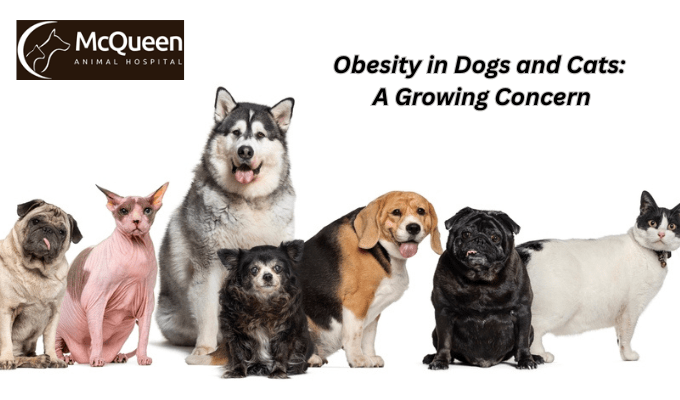At McQueen Animal Hospital, we’re passionate about helping your pets live longer, healthier lives. One of the most common issues we encounter—especially in adult and senior pets—is obesity. While a few extra pounds may seem harmless, excess weight in dogs and cats can lead to serious health problems.
What Is Pet Obesity?
Pet obesity is defined as an excessive accumulation of body fat that can negatively affect health. A pet is considered:
- Overweight if they are 10–20% above their ideal body weight.
- Obese if they exceed their ideal weight by more than 20%.
Unfortunately, over 50% of pets in North America are now classified as overweight or obese.
Health Risks of Obesity
Obesity can significantly shorten your pet’s life and increase the risk of many health conditions, including:
- Diabetes mellitus
- Arthritis and joint pain
- Heart and respiratory disease
- Liver dysfunction
- Increased risk during surgery
- Weakened immune system
- Lower energy and reduced quality of life
What Causes Obesity in Pets?
Several factors can contribute to pet obesity, including:
- Overfeeding – Too many treats, table scraps, or free-feeding
- Lack of exercise – Especially in indoor cats and older dogs
- Age and breed – Metabolism slows with age; some breeds are more prone to weight gain
- Spaying/neutering – Hormonal changes can affect metabolism
- Medical issues – Conditions like hypothyroidism or Cushing’s disease
Signs Your Pet May Be Overweight
Watch for these common signs:
- No visible waistline
- Difficulty feeling ribs without pressure
- Reduced interest in play or exercise
- Sluggishness or shortness of breath
- Difficulty climbing stairs or jumping
If you’re unsure, book an appointment for a Body Condition Score (BCS) assessment with one of our veterinarians.
Managing and Preventing Obesity
Here’s how you can help your pet maintain a healthy weight:
✅ Portion Control
Feed measured meals based on your pet’s ideal weight, not their current weight.
✅ Nutritionally Balanced Diet
Choose food formulated for your pet’s breed, age, and activity level. We can help recommend the right diet.
✅ Regular Exercise
Aim for daily walks, playtime, or interactive toys. Movement boosts metabolism and mental health.
✅ Routine Monitoring
Weigh your pet regularly to track their progress and catch weight gain early.
✅ Veterinary Support
If your pet is overweight, don’t worry—you’re not alone. We’ll help create a personalized weight-loss plan, including dietary counseling, exercise advice, and progress tracking.
Let’s Keep Your Pet Healthy Together
Helping your pet maintain a healthy weight is one of the best ways to show your love and care. If you’re concerned about your pet’s weight or want to take preventive steps, we’re here to help.


